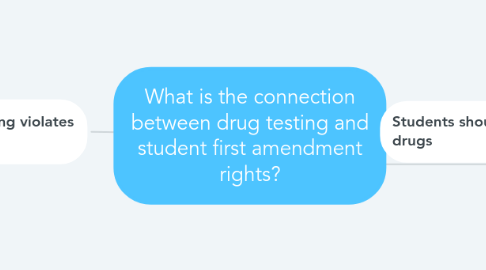
1. Random drug testing violates student rights
1.1. In 1998 school officials in Tecumseh Oklahoma,adopted the rule that all middle schoolers and high schoolers that are in any type of sports should accept to drug testing ("The case").
1.1.1. The families of two students challenged the policy in a lawsuit. Among other arguments, they claimed the policy violated the Fourth Amendment to the U.S. Constitution because searches could be conducted without suspicion of wrongdoing ("The case").
1.1.1.1. The reason it matters is because families are starting to get irritated to the point where lawsuits happen and it does violate our rights.
1.1.2. The supreme court has said that "schoolchildren do not shed their constitutional rights when they enter the schoolhouse" ("The case").
1.1.2.1. This quote shows that students do, in fact maintain their basic constitutional rights at school.
1.2. Kids parents who think their kids are doing drugs have the right to test their kids they don't need the school to do it for them (Saunders).
1.2.1. When the U.S. Supreme Court ruled on drug tests tests in 1995, the rationale for the tests had expanded. The [justices on the high court's] Big Bench supported testing of athletes to prevent the "increased risk of sports-related injury," but also because athletes are role models (Saunders).
1.2.1.1. I argue that the court was wrong. Athletes are not necessarily role models, therefore this argument is invalid.
1.2.2. Lloyd Johnston, a leading researcher at the University of Michigan,noted in 2003 that there is "a serious question of whether drug testing is a wise investment," as it is not clear that it deters student drug use (Saunders).
1.2.2.1. This quote makes me think that schools waste a lot of money on drug testing even though the issue really should be handled by parents and families.
1.3. because schools,parents,families and kids are starting to see that drug testing is no needed parents can start to go against the school
1.3.1. because random testing hurts other students confidence espically the students who don't do drugs they could start to feel like a bad kid/teen
2. Students should be tested for drugs
2.1. Students across the country have been asked and some are being forced to take a breathalyzer and urine test just to be allowed to participate in school activities and some extend to every school activities ("Put").
2.1.1. Educators say the tests strengthen "zero tolerance" drug and alcohol policies ("Put").
2.1.1.1. Increasing the "zero tolerence" is good because students that are scared of drugs will feel more safe knowing that drugs are not allowed at school.
2.1.2. The Fourth Amendment to the U.S. Constitution protects citizens from unreasonable searches and seizures. In 2002, however, the U.S. Supreme Court upheld the fight of schools to randomly test students in competitive activities for drugs. Whether that extends to all student functions remains in question ("Put").
2.1.2.1. Yes the government can decide to cancel out drug testing but if schools feel the need to do the testing to students then they should.
2.2. School safety is important for a safe environment for the kids,children, and teens. Drugs that are present in the environment can destroy and after the outstanding amount of students selling them and using them the U.S. supreme court ordered for random drug testing (Evans).
2.2.1. Recently [2002], the United States Supreme Court came out with a commonsense ruling in favor of student drug testing. The Court decided that the health and safety of schools and students outweighed an individual student's minimal privacy interest when it comes to drug testing (Evans).
2.2.1.1. To us the students that feel uncomferable with drugs we can start to feel more safe with drug testing happening.
2.2.2. A 1997 CASA survey revealed that high school students see more drug deals at school than in their neighborhoods. In the survey, 76% of high school students claim that drugs are kept, used, or sold on school grounds. In addition, 29% of high school students claim that a student in their school died from a drug- or alcohol-related incident in the past year (Evans).
2.2.2.1. This makes me think that the only reason there is more drug selling at school is because there is more places to hide.
2.3. Because If students are tested for drugs it can create a more safe enviroment.
2.3.1. Because Drug testing should happen because certain schools require it for sports.

